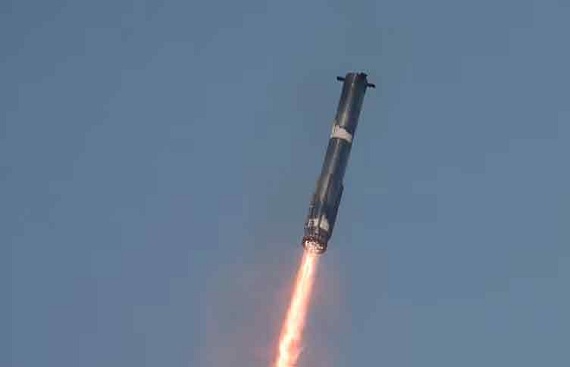Elon Musk's Starship Faces Second Consecutive Test Failure
By
siliconindia | Friday, 07 March 2025, 23:39 Hrs

SpaceX's bold Starship spaceship burst apart in space, just a few minutes after it took off from Texas, the second successive failure this year of Elon Musk's Mars rocket venture. The accident caused the Federal Aviation Administration (FAA) to suspend air traffic for a short while in some parts of Florida.
Videos online showed blazing pieces of debris streaming across South Florida and the Bahamas' evening skies. SpaceX's live feed reports that the Starship disintegrated in space after its engines lost power and it tumbled uncontrollably.
The accident came more than a month after the seventh test flight also resulted in an explosion. The consecutive failures are a setback to SpaceX, particularly since these failures occurred during initial mission phases that the company had easily cleared in the past. The 403-foot (123-meter) rocket system is central to Musk's ambitious plan of sending humans to Mars in the next decade.
The FAA imposed ground stops at principal Florida airports, such as Miami, Fort Lauderdale, Palm Beach, and Orlando, due to issues of 'space launch debris'. The agency has initiated a mishap investigation into the incident.
The rocket took off at approximately 6:30 p.m. ET (2330 GMT) from SpaceX's Boca Chica launch site. The Super Heavy booster, which performed the initial liftoff, returned to Earth as intended and was successfully caught in mid-air by a SpaceX crane. But the upper stage of the Starship lost balance a few minutes later, with several engines cutting off.
"Unfortunately this occurred last time too, so we've got some practice now", SpaceX spokesperson Dan Huot remarked during the live stream, making reference to last time's failure.
In a statement issued Thursday evening, SpaceX described how Starship had suffered an 'energetic event' in its rear section, leading to the loss of multiple engines.
"This resulted in a loss of attitude control and eventually a loss of communications with Starship", the statement continued. "The last contact with Starship occurred about 9 minutes and 30 seconds after launch".
SpaceX assured people that the debris did not carry any toxic substance. The failure of Starship in January had also ended with an explosion at eight minutes of flight, distributing debris across Caribbean islands and minor damage to a vehicle in the Turks and Caicos Islands.
The FAA, which regulates private rocket launchings, said its investigation would compel SpaceX to determine the root cause of failure and get approval from regulators prior to the subsequent launch. The FAA had authorized SpaceX for this week's launch despite the still-pending probe into the failed test, which it had approved after reviewing early results and clearing the flight.
The eighth test was also designed to achieve a near-full orbit around the Earth, including a planned splashdown and re-entry in the Indian Ocean. The mission simulated a landing sequence that SpaceX aspires to undertake on land sometime in the future, marking a significant next phase in the development of Starship.
Regardless of the failure, SpaceX is committed to perfecting Starship, seeing failures as part of being able to develop and innovate very quickly. The company's end intention does not change: making humans a multi-planetary species.
